As London’s streets buzz with the latest tech and every whisper becomes data, Jake and Lila rediscover the lost art of the handwritten word – but at what cost?
“Blimey, Lila, another advert for dog food?” Jake exclaimed, aghast, as he thrust his mobile phone towards her. On the screen was a cheeky advertisement featuring a bounding puppy amidst a spread of kibble. “I only mentioned getting a dog 10 minutes ago, in our private chat! They can’t be monitoring our conversations in real-time, can they?”
Lila sighed, her brow furrowing in frustration. She unlocked her own device, showing Jake an elaborate ad for luxurious wedding venues. “See this? I had this ad pop up not an hour after our call discussing Sara’s surprise engagement. Between these eavesdropping apps and their invasive algorithms, it’s like we’re living in some corporate surveillance state. It’s getting out of hand, Jake.”
At the cafe table next to them, a woman in her late thirties, with salt and pepper hair, was busy scribbling into a beautiful leather-bound notebook. She overheard their conversation and smiled, “Switched to this a month ago.” She tapped the notebook with her pen. “Ever since, no weirdly accurate ads.”

Lila’s eyes widened, “You mean, because you’ve been writing instead of typing?”
The woman nodded, “Exactly. In today’s world, everything electronic seems to have ears. They’re scanning your texts, eavesdropping on your voice notes, analysing your emails. But they can’t scan this.” She waved her notebook.
Jake leaned in, intrigued, “It sounds liberating, but wasn’t it a tough switch? I mean, our lives are so digitised now. Has it been difficult? Adjusting, I mean.”
She leaned back, the leather seat creaking ever so slightly, and considered the question. “A tad. But there’s a charm to it. It feels… real. Like I’m connecting with my thoughts. No pings or notifications. Just me and the paper.”
Later that week, Lila and Jake took a weekend trip to Venice. They wandered around, admiring the city’s canals and unique shops. As they walked, they spotted an old store selling handmade stationery, notebooks, and pens.
Lila nudged Jake, “Remember that woman in London?”
Jake looked puzzled for a moment. “Which woman?”
“The one who talked about using notebooks for privacy!”
Recognition flashed in Jake’s eyes. “Oh, right!” he said, smiling.
They went into the shop. Inside, the smell of fresh paper and ink filled the air, and wooden shelves showcased a variety of notebooks and pens.
“How do I even use one of these?” Jake asked, picking up a notebook with a puzzled look.
“I remember my dad always had one,” Lila recalled. “He said it should be small enough to fit in your pocket.”

“Your dad had the right idea,” the shopkeeper commented, joining their conversation.
Lila grinned at him. “We heard people are going back to notebooks because they’re worried about online privacy.”
The shopkeeper nodded, handing Lila a notebook with a marbled cover. “It’s making a comeback,” he said with a smile. “People don’t want to be listened to all the time. They want their thoughts to stay private.”
Jake picked up a fountain pen, “It’s like… we’re going back in time.”
The shopkeeper winked, “Sometimes, the old ways are the best.”
Jack and Lila returned to London, their bags now filled with pocket-sized notepads, calendars, and sleek pens.
It wasn’t an instant change. Weeks passed as they transitioned from digital to paper. But soon, they noticed they weren’t alone in this shift. At local cafes and parks, people weren’t just glued to their phones anymore. Many were jotting notes, sketching, or flipping through paper calendars decorated with colourful notes.
One day at a park, a stranger eagerly showed Lila her small diary. “I’m keeping everything on paper now. I don’t want big tech tracking my every thought.”

Jake chimed in with a chuckle, “I’ve even ditched my digital calendar for a paper one. Never imagined I’d go back to that!”
Inspired, Jake planned a ‘Pen & Paper’ gathering at a nearby community hall. The response was overwhelming. A diverse crowd showed up, eager to share stories, give tips, and even learn calligraphy and drawing.
The city’s pulse had changed. London, usually seen as a hub of modernity and digital progression, was now witnessing a tangible shift. Stationery shops, once fading into obscurity, were now lively hubs. People queued at post offices, eager to send and receive handwritten notes, and local journalists wrote about this ‘Analog Rebellion’ with a mix of curiosity and admiration.
The ‘Pen & Paper’ meetups became something of a phenomenon. They weren’t just gatherings; they were a movement.
As they sat in one such meetup, Esther, an older lady with wise eyes, spoke up amidst the hum of discussions. “It’s not just about dodging those creepy ads,” she remarked, pausing to enjoy her tea. “It’s about taking back our space, our thoughts.”
Jake agreed, his tone firm, “What we jot down, the memories we capture – they’re our stories. They shouldn’t be reduced to just another byte of data for a tech giant to exploit.”
Lila added, her eyes shining, “It feels like we’re finding our voice again. A voice that’s undeniably, unmistakably ours.”
That marked the end of the ‘Pen & Paper’ meetups in London and, in fact, the entire UK. As the police stormed the building, every participant was detained, accused of conspiracy and planning against the government. Their notepads, calendars, and personal letters were all seized, set to be presented as evidence in the impending trial.

All images generated using Midjourney
